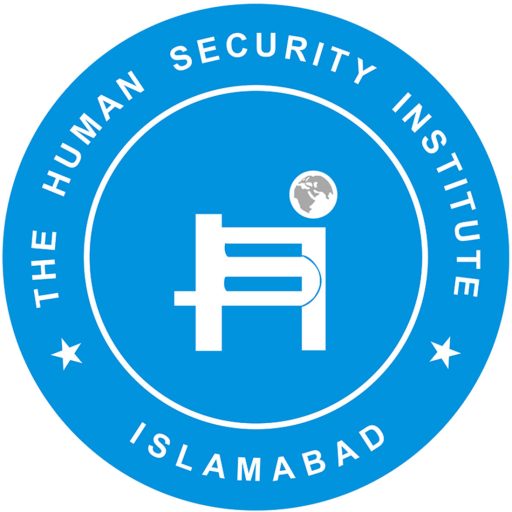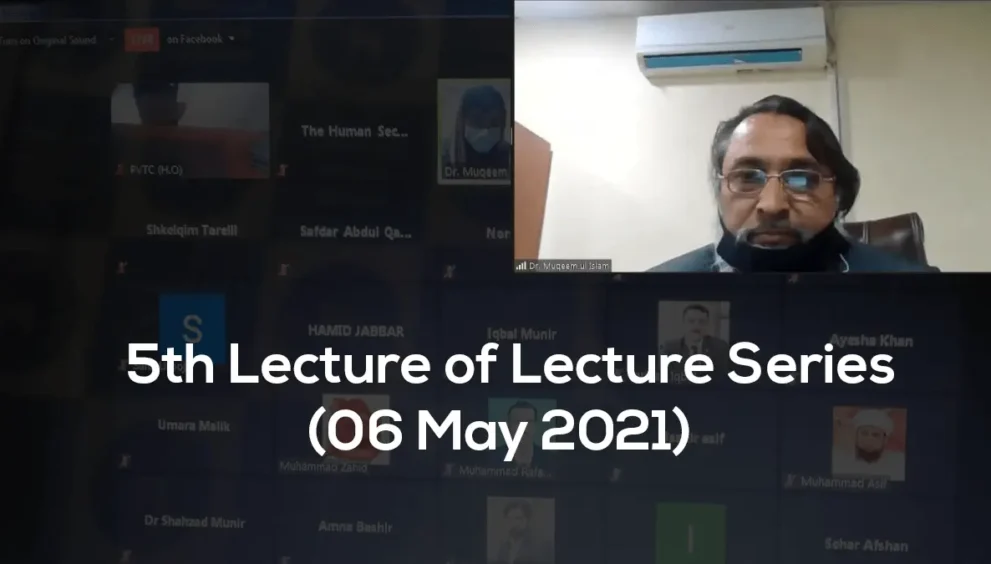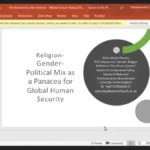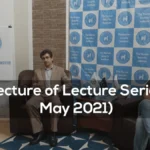The Human Security Institute
Minutes of 5th Lecture of Lecture Series on Exploring the dimensions of Human Security
Guest Speaker: Dr. Muqeem ul Islam Soharwardy
Date: May 6, 2021
Time: 01:00 pm
Human security as defined in Human Development Report:
Human development report presented in 1994 was a first step towards mainstreaming Human security. The report identified the nature and types of security, which was a departure from the traditional aspect of security with state at its center. The seven types of security defined in the report are given below:
- Economic security
- Food security
- Health security
- Environmental security
- Physical security
- Community security
- Political security
Certain challenges to maintain the human security with the traditional understanding of security were also discussed and a clear distinction was made between these two different approaches. To maintain this balance, we need to identify the differences between human security and traditional security.
What is human security?
When talking about security, we need to realize that security is not always concerned with the military aspect of a conflict, such as war, but it also encapsulates the human aspect which is often overlooked due to an increased emphasis on the traditional modes of security. Human security
deals with several issues that affect an individual in a society. Human security accentuates the distress caused by poverty, disease and violence and try to remove such threats, empowers an individual, and helps build better systems for the humans to coexist in a peaceful environment.
Difference Between Human Security and Traditional Security:
As we know the human security emphasizes more on human development. It talks about the development of an individual in a society. The human security emphasizes on government spending on its citizens to strengthen the social fabric of a society rather than spending on the state, as the traditional security has state at its center and as its focus. Human security is focused on protecting the integrity of an individual. whereas the traditional security maintains the integrity of state.
Human Induced Environmental Stressors:
Humanity has left a deep impact on environment as the world is witnessing a long-lasting change to our environment due to human intervention. Factors that affect our environment are as follows:
- Resource claims: claim on resources and territory through interstate border claims or the denial or restriction of resources to the individual as a state policy.
- Resource depletion: the depletion of resources through agricultural, industrial, or domestic activity leading to the scarcity of certain resources, such as food and water.
- Resource degradation: the degradation of environment due to the industrial, agricultural, or domestic activity leading to human health stress or threat to ecosystem.
Environmental Security and Human Security:
The environmental security attempts to address the following threats to an individual:
- Poverty
- Pandemics
- Environmental degradation
- Lack of access to drinking water
- Natural or man-made disasters
- Maternal and child health risks
- Unemployment
- Violence
- Lack of road safety
Disruptions to the Environmental Security:
- Disaster: A disaster is a sudden, calamitous event that seriously disrupts the functioning of a community or society and causes human, material, and economic or environmental losses that exceed the community’s or society’s ability to cope using its own resources.
- Natural Hazards: Natural hazards are naturally occurring physical phenomena caused either by rapid or slow onset events which can be geophysical (earthquakes, landslides, tsunamis, and volcanic activity), hydrological (avalanches and floods), climatological (extreme temperatures, drought, and wildfires), meteorological (cyclones and storms/wave surges) or biological (disease epidemics and insects and animal plagues).
- Technological or man-made hazards: Technological or man-made hazards are events that are caused by humans and occur in or close to human settlements. This can include environmental degradation, pollution, and accidents. There are a range of challenges, such as climate change, unplanned urbanization, under-development poverty as well as the threat of pandemics, that will shape humanitarian assistance in the future. These aggravating factors will result in increased frequency, complexity, and severity of disasters.
Human security is aimed at minimizing these impacts to the environment, as it is essential to keep the environment intact for the survival of mankind. Environmental security must be a top priority, where there should be a heavy emphasis on minimizing the human impact on the environment and measures should be taken to restore the damages already done to the environment. Environmental security not only impacts the ecosystem, but it also impacts the agriculture and the standard of living of an individual. It’s essential to protect the environment at any cost.
ANNEX A
A brief introduction Of Dr. Muqeem Islam Soharwardy (Director General, National Vocational and Technical training Commission (NAVTTC), Government of Pakistan & CEO of National Accreditation Council for TVET
Dr. Muqeem Islam, holds Doctorate degree in Public Policy & Government from National Defense University. his doctoral dissertation entitled “Impact of Institutional Q quality and Governance on Structural Change and Economic Development: A Cross Country Analysis”. Author has published many research papers on various topics related to economics and public policy. Dr Muqeem is currently working as Director General (Accreditation & International Cooperation) at National Vocational and Technical training Commission (NAVTTC), Government of Pakistan and CEO of National Accreditation Council for TVET. During his stay in NAVTTC, he has served also served as Director General (Planning & Development), Director General (skill, Standards & Curricula), He has rich experience of reforms, training and research. He took many initiatives at NAVTTC which change landscape of NAVTTC drastically which inter alia include (a) B development of curricula of 27 diploma in accordance to international standards Competency based training & assessment (CBT&A) (c) Changed the image of NAVVTC by developing diploma courses and introducing short courses for Robotics, Artificial intelligence, Mechatronics and cloud computing (d) initiated a move to introduce EU quality management standard in the accreditation process of TVET institution in Pakistan (e) negotiated, drafted and processed MOUs with many countries i.e. Finland, Turkey, Singapore, Australia, Saudi Arabia (f) drafted a strategic Plan for enhancing cooperation amongst OIC member countries under the umbrella of SESRIC, Ankara Turkey. He is a motivational speaker and professional trainer in the fields of Strategic management, Public Policy Design & Evaluation, Project Management, Monitoring & Evaluation, Macro Economic Policy Management, Leadership in Civil Services, Governance Reforms, Training of Trainers, curriculum development etc. He has been involved in teaching, training and managing more than 14 NIPA Advanced courses and more than 20 Mid Career and Senor Management Courses during his tenure as faculty member in NIPA and NSPP. He imparted training at National Bank staff college, PTCL staff college and several other institutions at home and abroad including two training sessions to top management of Bankers in Mauritius and training to OIC member country workshop in Istanbul. Author has traveled to for training related activities including Turkey, China, Philippines, UK, Qatar and Canada. He worked as economist in Fiscal Research department in state bank of Pakistan where he participated in the economic policy design and reform process of state bank o Pakistan. He joined NIPA in 1999 as faculty member as a deliberate choice to alter the fate of civil service by reforming and enriching training process. He served as directing staff in NIM, Peshawar and Chief Instructor in NIM Islamabad. He introduced many successful initiatives inter alia include (a) twelve days compulsory training for all civil servants which remained intact from 2001 to 2004 (b) initiated idea foreign master degree in the fields of Public Policy for civil servants who intend to join National School of Public policy as faculty member. Under this initiative more than 400 civil servants acquired master degrees in the field of Public policy during 2003-2005. (c) Initiated concept paper in 2001 for establishing “National School of Public Policy” by merging all NIPAs, Administrative Staff College and Civil Services Academy. Actual model introduced by him of the NSPP was just similar to INTAN of Malaysia however due to resistance from certain quarters of bureaucracy the whole idea could not be implemented. However, He remained involved in the reforming process of NSPP and formulation of training courses from MCMC, SMS and NMC in the beginning. (d) He remained part of in the team of drafting governance reforms during 2014-2015. Current government has adopted same draft partially for governance reforms



